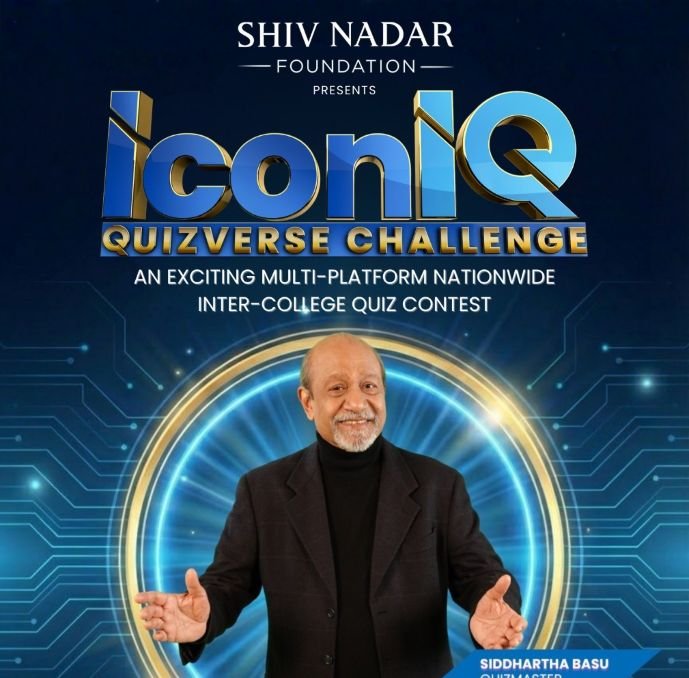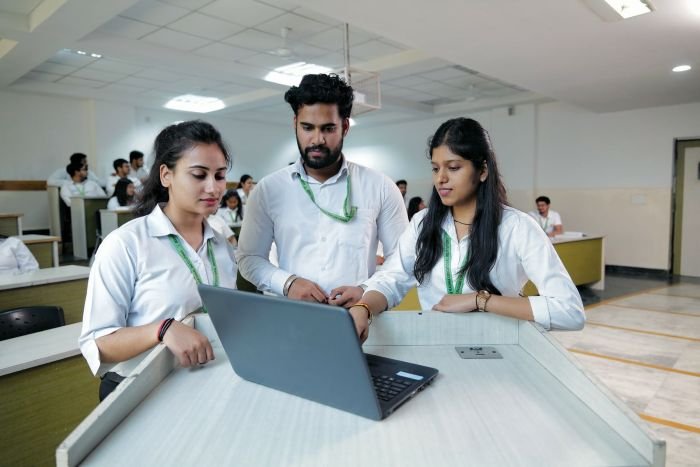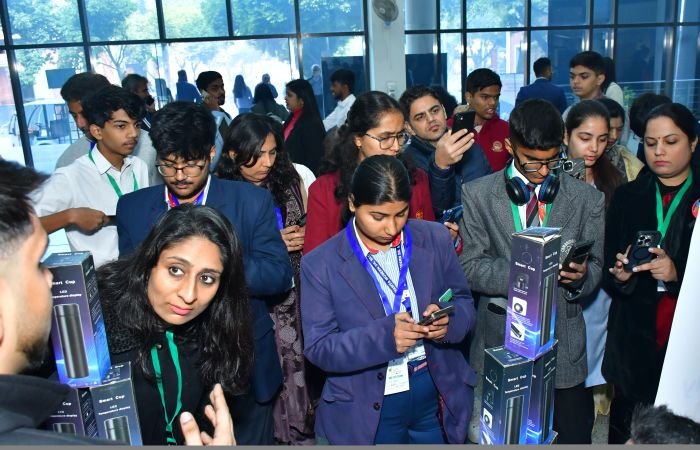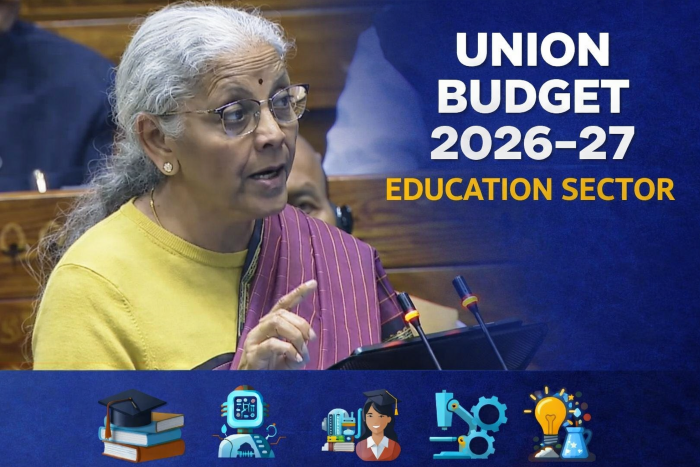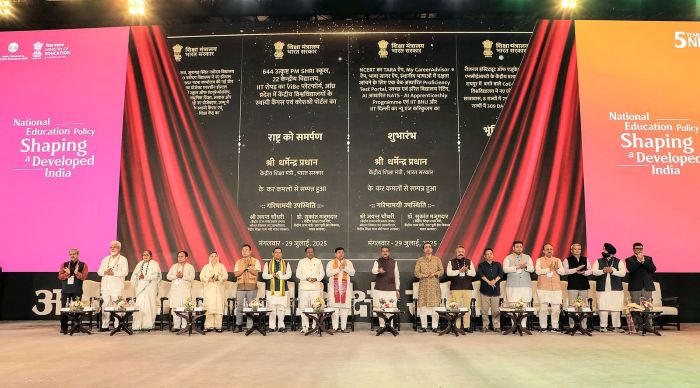
The Akhil Bharatiya Shiksha Samagam (ABSS) 2025, held at Bharat Mandapam, marked a historic celebration of the 5th anniversary of the National Education Policy (NEP) 2020, with the Ministry of Education announcing an array of digital, infrastructure, and academic initiatives exceeding ₹4,000 crore in value.
Union Education Minister Dharmendra Pradhan presided over the event, which featured the unveiling of transformative digital platforms, AI-driven learning tools, curriculum reforms, and international collaborations aimed at deepening the global footprint of Indian higher education.
Key Announcements and Initiatives in higher education
1. Local Language Proficiency Test Portal by NTS-India
Developed by the National Testing Service – India, this web-based portal enables online assessment of Listening, Speaking, Reading, and Writing (LSRW) in 22 Indian languages. It boasts a database of 182,480 test items and over 1,825 distinct tests, contributing to inclusive multilingual assessment and pedagogy.
2. AI Apprenticeships Under NATS
The Ministry of Education launched AI Apprenticeship programs under the National Apprenticeship Training Scheme (NATS) to bridge skill gaps in sectors such as healthcare, manufacturing, BFSI, and IT.
- Target: 1 lakh students
- Stipend: ₹9,000/month (graduates), ₹8,000/month (diploma holders)
- Outlay: ₹500 crore (government + industry co-funded)
3. Curriculum Reforms at IIT BHU & IIT Delhi
- IIT BHU unveiled a flexible, multidisciplinary B.Tech. structure allowing minors, dual majors, and industry internships.
- IIT Delhi introduced updated UG, PG, and PhD programs for 2025–26, emphasizing:
- Hands-on learning
- Industry collaboration
- AI/ML and sustainability focus
- Flexible entry/exit options
4. ViBe by IIT Ropar
ViBe (Engage. Enjoy. Enlighten.), an AI-powered active learning platform, redefines digital education through:
- Bite-sized lessons
- Real-time feedback
- Adaptive learning paths
- Empowering educators via automated assessments, enhancing focus on experiential learning.
5. Bhasha Sagar App
Aligned with Ek Bharat Shreshtha Bharat and NEP 2020, this app enables language learning from one Indian language to another—without English mediation.
- Courses: 18 conversation modules, 24 vocabulary-building modules across 22 languages
- Features: AI-based conversation facilitator, auto-certification through app-based assessments
6. Centre for Indian Knowledge Systems & Encyclopaedic Sanskrit Dictionary (IKS-ED)
Established at Deccan College, Pune, the IKS-ED Centre:
- Houses 15 lakh+ Sanskrit words and 1 crore references from 1,500 ancient texts across 62 disciplines
- Traces linguistic, semantic, and historical evolution from the Rigveda (14th century BCE) to the 19th century
7. KoshaSHRI Portal
Developed under the DST’s SHRI scheme by C-DAC Pune, KoshaSHRI:
- Digitizes all 35 volumes of the Encyclopaedic Sanskrit Dictionary
- Offers advanced search, Sanskrit authoring tools, and collaborative lexicography
- Now open to the public for linguistic research and education
New Infrastructure: Campuses, Lecture Halls, Hostels Inaugurated
Key facilities inaugurated or dedicated include:
- IIT Bombay: Students’ Hostel and Desai Sethi School of Entrepreneurship (DSSE)
- Central Universities: Building inaugurations at CU Jammu, CU Punjab, and dedication of Central University, Andhra Pradesh
- NITs: New facilities at NIT Bhopal, Jaipur, Jalandhar, Surathkal, Tiruchirappalli, and Delhi
- NIT Raipur: Foundation stone laid for Centre of Excellence in Innovation & Entrepreneurship (CoE-IEET)
Global Collaborations: Foreign Universities to Establish Campuses in India
In a major move under NEP’s internationalization agenda, Letters of Intent (LoIs) were presented by four leading global universities to set up campuses in India:
| University | Location in India | Programs Offered |
| Western Sydney University (WSU) | Greater Noida | B.A. in Business Analytics & Marketing, MBAs |
| Victoria University (VU) | Noida | UG in Business, Data Science; PG in IT, MBA |
| La Trobe University | Bengaluru | UG in Business, Public Health, Computer Science |
| University of Bristol (UK) | Mumbai | Joint UG-Masters, AI, Design & Innovation, Analytics |
These initiatives mark a new era of globally accessible education within India, eliminating the need for outbound student migration while maintaining international standards.
Showcase of NEP Impact & Future Vision
The Samagam also featured:
- A short film on NEP 2020’s key milestones
- A national exhibition on themes like:
- Experiential Learning
- AI in Education
- Sustainable Schools
- Community Engagement Programs (e.g., Prerana, Vidyanjali, ULLAS)
Thematic Discussions: Future of Indian Education
Four parallel sessions focused on:
- Bharatiya Bhasha in Teaching & Learning
- Anusandhan & PMRF for Research Leadership
- Achieving 100% GER in Secondary Education
- Artificial Intelligence in Teaching & Learning
Minister’s Vision
Speaking at the event, Dharmendra Pradhan emphasized NEP 2020 as the foundation for a “globally competent, digitally empowered, and inclusive education system.”
“NEP 2020 is the most impactful instrument to realise this dream. He urged all stakeholders to take focused and proactive steps to ensure that every classroom becomes a space for meaningful learning and that every child’s potential is nurtured,” he said.
📌 At a Glance: Highlights of ABSS 2025
| Initiative | Impact |
| AI Apprenticeships (NATS) | ₹500 Cr outlay; 1 lakh students to benefit |
| ViBe Platform | Transforming digital learning across disciplines |
| IKS-ED Sanskrit Dictionary | 15 lakh words; 1 crore references across texts |
| New Foreign Campuses | 4 top global universities to set up in India |
| Language Learning (Bhasha Sagar) | 22 Indian languages with real-time AI chat |
| KoshaSHRI Portal | Open access to digital Sanskrit knowledge |
| Infrastructure Inaugurations | 11 major institutes upgraded or launched |
The Akhil Bharatiya Shiksha Samagam 2025 not only commemorated the progress of NEP 2020 over the past five years but also set a robust, future-focused agenda. With a strong blend of digital innovation, global partnerships, and inclusive development, India reaffirmed its commitment to building a world-class, equitable, and student-centric education system.


